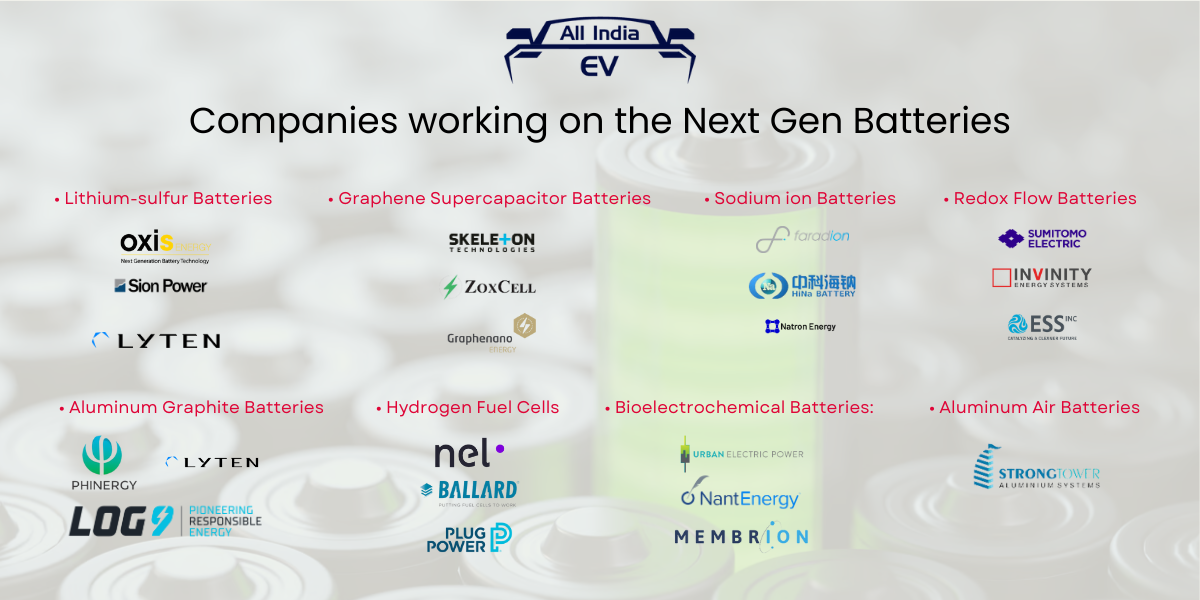Companies working on the Next-Gen Batteries
Here is the list of companies who are working on the next-generation batteries, those batteries that have the potential to replace the lithium-ion batteries in the future.
1). Lithium-sulfur batteries: These batteries have the potential to offer higher energy density and lower cost than lithium-ion batteries. Some of the companies that are developing lithium-sulfur batteries are:
a). Oxis Energy, a UK-based company that claims to have achieved over 400 Wh/kg of energy density and aims to reach 500 Wh/kg by 2022.
b). Sion Power, a US-based company that has partnered with BASF to commercialize its Licerion technology, which promises over 500 Wh/kg of energy density and over 1000 cycles of life.
c). Lyten, a US-based company that uses 3D graphene as a cathode material for its lithium-sulfur batteries, which can deliver over 600 Wh/kg of energy density and fast charging capabilities.
2). Hydrogen fuel cells: These devices convert hydrogen and oxygen into electricity and water, offering zero-emission and high-efficiency power generation. Some of the companies that are working on hydrogen fuel cells are:
a). Ballard Power Systems, a Canadian company that is a global leader in fuel cell solutions for various applications, such as buses, trucks, trains, ships, and data centers.
b). Plug Power, a US-based company that provides hydrogen fuel cell systems for material handling, transportation, and stationary power markets.
c). Nel Hydrogen, a Norwegian company that offers solutions for hydrogen production, storage, and distribution, as well as fuel cell systems for mobility and industrial use.
3). Graphene supercapacitor batteries: These batteries use graphene as an electrode material to achieve high power density, fast charging, and long cycle life. Some of the companies that are working on graphene supercapacitor batteries are:
a). Skeleton Technologies, an Estonian company that is the global leader in graphene-based supercapacitors and energy storage systems.
b). Zoxcell, a UAE-based company that manufactures and distributes graphene supercapacitor batteries for solar, telecom, electric vehicles, and other applications.
c). Graphenano Energy, a Spanish company that develops graphene-based supercapacitors and hybrid batteries for various sectors, such as automotive, aerospace, marine, and defense.
4). Redox flow batteries: These batteries store energy in liquid electrolytes that can be pumped through a cell stack to produce electricity. They offer long-duration, scalable, and flexible energy storage solutions. Some of the companies that are working on redox flow batteries are:
a). ESS Inc, a US-based company that provides iron flow batteries for grid-scale energy storage applications.
b). Invinity Energy Systems, a UK-based company that offers vanadium flow batteries for renewable energy integration, microgrids, and commercial and industrial power backup.
c). Sumitomo Electric Industries, a Japanese company that has developed a redox flow battery system using vanadium bromide as the electrolyte.
5). Aluminium graphite batteries: These batteries use aluminium as the anode material and graphite as the cathode material, offering high energy density, low cost, and safety advantages over lithium-ion batteries. Some of the companies that are working on aluminium graphite batteries are:
a). Lyten, a US-based company that also develops aluminium graphite batteries in addition to lithium-sulfur batteries.
b). Phinergy, an Israeli company that produces aluminium-air batteries for electric vehicles and other applications.
c). Log 9 Material, an Indian company that has developed an aluminium fuel cell technology that can power electric vehicles for long distances.
6). Bioelectrochemical batteries: These batteries use biological organisms or enzymes to catalyze the oxidation of organic fuels or the reduction of oxygen at the electrodes. They offer eco-friendly, biodegradable, and low-cost energy generation. Some of the companies that are working on bioelectrochemical batteries are:
a). NantEnergy, a US-based company that provides zinc-air rechargeable energy storage systems for various markets, such as telecom, microgrids, rural electrification, and electric vehicles.
b). Urban Electric Power, a US-based company that manufactures zinc-manganese dioxide rechargeable battery systems for grid-scale energy storage applications.
c). Membrion, a US-based company that develops novel ion exchange membranes for various electrochemical devices, such as fuel cells, electrolyzers, and bio-batteries.
7). Sodium ion batteries: These batteries use sodium ions as the charge carriers instead of lithium ions, offering similar performance but lower cost and higher safety than lithium-ion batteries. Some of the companies that are working on sodium ion batteries are:
a). Faradion, a UK-based company that is a pioneer in sodium-ion battery technology, offering solutions for electric vehicles, energy storage, and consumer electronics.
b). HiNa Battery Technology, a Chinese company that specializes in the research, development, and production of sodium-ion batteries and materials.
c). Natron Energy, a US-based company that develops high-power, long-life, and low-cost sodium-ion batteries for various applications, such as data centers, industrial power backup, and electric vehicles.
8). Aluminium air batteries: These batteries use aluminium as the anode material and oxygen from the air as the cathode material, offering high energy density, low weight, and long shelf life. However, they are not rechargeable and require water to operate. Some of the companies that are working on aluminium air batteries are:
a). Phinergy, an Israeli company that also develops aluminium air batteries in addition to aluminium graphite batteries.
b). Aluminium POwer Systems, an Indian company that provides aluminium air battery solutions for electric vehicles and other applications.
c). Aluminium Fuel Cell, a UK-based company that develops aluminium fuel cell technology for various sectors, such as automotive, marine, defense, and aerospace.
Click here for more such informative insights
Join the All India EV Community





